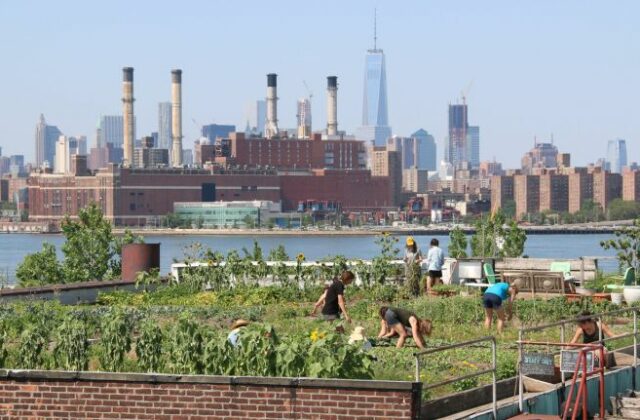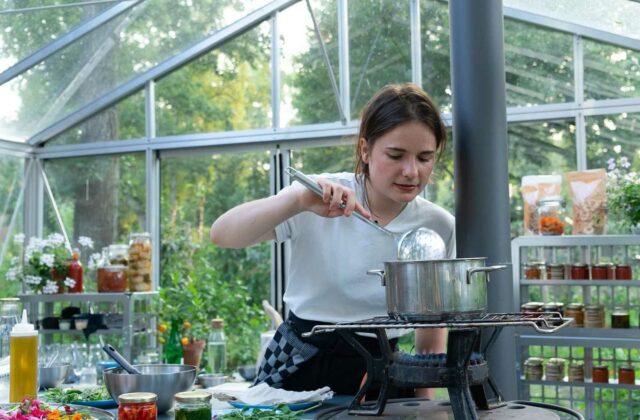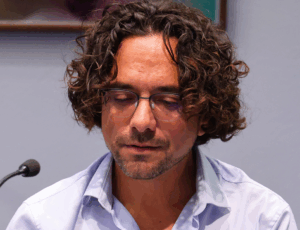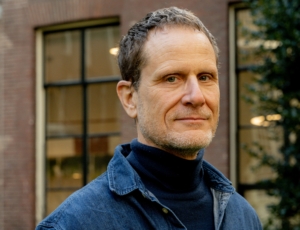
'Harvesting Care' column by Anna Kooi
Column
As a food sociologist and chef, one of Kate’s research questions speaks to me in particular: how did people feed themselves before industrial agriculture? Or, in other words: what can we learn from pre-industrial knowledge when it comes to our food system? In fact, Kate invites us to look over our collective shoulder, imagine a world before the Industrial Revolution – which for many of us already is difficult enough – and learn from our ancestors. Now that climate change is no longer merely a mighty sword of Damocles dangling around our planet, but has become an undeniable reality in many parts of the world, perhaps we will finally let go of the once so shiny narrative of unlimited economic growth, and turn to our ancestors with humility.
When reimagining our food system, which types of knowledge might have been overlooked? What have we disregarded, dismissed, muted?
When reimagining our food system, which types of knowledge might have been overlooked? What have we disregarded, dismissed, muted?
The answer is: a lot. As postcolonial anthropologist Arturo Escobar brilliantly points out in his work on political ontology[i], the neoliberalizing globalizing One World Project has eroded our ability to perceive ways of knowing that diverge from the dominant ideology of capitalism. Consequently, the world as a place which is governed by individuals and markets, seems to be ‘just the way things are’. This depoliticizing common sense demonstrates the crucial need for critical thinkers and artists, to spark imagination, to slow down, and be humble. In his work on the sociology of absences[ii], Boaventura de Sousa Santos urges us to recognise the rich diversity of knowledges that exist outside of the monocultural realm of capitalist thinking. Rather than turning to high-tech solutions, which often come in an unpleasant one-package-deal with corporate monopolised knowledge, now might be time to recognize the importance of knowledge that is passed down informally, from generation to generation, through an intricate web of social relationships.
When we talk about informal knowledge, or ‘know-how’ if you will, both the garden and the kitchen as universal meeting places have been key sites for the production of subjugated knowledge. I argue that it is here that we might find answers to the urgent questions of our time. How can we grow food in and around our city apartments? How can we relearn to eat in tandem with the natural rhythms of the seasons? How can we adjust our diet to times of scarcity and abundance? Which also implies: how can we learn to preserve food again, like our grandparents did?
Ironically, in times of increasing xenophobia, this knowledge still seems vibrant and alive mostly among immigrant communities. For the past years, I have been working with Cascoland[iii], a community art project in Amsterdam New West, on building a biocultural archive of food preservation techniques. This meant long days of cooking with local residents, most of whom are first and second generation immigrants. One day, we were working with bell peppers. To my surprise, instead of being thrown away thoughtlessly, all bell pepper seeds were carefully removed, cleaned and kept by our Turkish neighbors – for their own vegetable cultivation. While I myself participated in several workshops to learn about ‘foraging’, or collecting edible plants from public spaces, these women flawlessly identify delicious weeds, nutritious herbs and fruit trees on the street. Seeing the city as an edible landscape is something I learned from them.
So where did we go wrong? Let’s take a step back. As Karl Marx captured in his famous alienation theory, the Industrial Revolution alienated us from our human nature, from the ways in which very basic necessities for our human existence are produced. One could argue that food is the most basic necessity of all. As a person who was born and raised in Amsterdam, as a child I was as good as completely unaware of the ways in which my food arrived to my plate. I think it’s safe to say that thanks to our collective dependence on the supermarket, most urban dwellers frankly have no clue about the processes that take place prior to the clean and bright aisles packed with plastic wrapped food, which, for the record, explains why they are often mocked by farmers. Our collective alienation from food production has caused us to lose knowledge and thus agency over our food.
Farming doesn’t have to be a fight against nature, like it has been in industrial agriculture.
And that’s exactly why urban farms are vital. They reintroduce the rural in the urban, reminding us of the messy processes involved in food production, thus automatically reconnecting us to nature. Urban farms are places where we encounter natural processes of grow and decay, sow and harvest, birth and slaughter. Now that even the remotest places of our planet have been modified by humanity, does nature even still exist? I argue that it does. But there is one condition: in order to truly grasp the importance of urban farms as natural places, we must let go of the notion of nature as wilderness. The perceived dichotomy between nature conservation and food production that dominates environmental policy-making is based on a dualist and romantic notion of nature as a pristine wilderness, untouched by human hands, rather than as an ecosystem in which humans and the production of their food can have an integral and even beneficial role.[iv] Farming doesn’t have to be a fight against nature, like it has been in industrial agriculture. This becomes clear immediately if we consider non-Western agricultural systems, such as the milpa, a food forest garden that generates the growth of seemingly pristine rainforest.[v]
But let’s go back to Amsterdam. Because urban farms are places not only where we encounter nature, but also our fellow citizens. In times of increasing socio-economic inequality and polarization, informal spaces where we meet each other are crucial. Through farming, cooking and eating together we build long-term relationships that foster reciprocity, trust and mutual respect, which can serve as an antidote for capitalist relationships based on competition. We human beings are social creatures who exist in a web of social relations. Especially now that we spend an average of 7 hours behind screens, urban farms might help us to become social creatures again through commoning – which according to Silke Helfrich’s definition[vi] is the creation and maintenance of relationships, while acknowledging our interpersonal connections and interdependencies. The fact that I use it here as a verb is no coincidence. Commons cannot exist without commoning. It is through shared work, such as tending our crops and cooking our meals, that we forge bonds. Farming and cooking are both universal human activities that are moreover strongly related to our sense of belonging and identity. Perhaps it’s as simple as that. We must get out of our offices, break free from the screen spell, and get busy in the fields, or the kitchen. Or both.
This directly ties into the way in which we organise care as a society. What kind of care are we talking about? It is ironic that our heavily understaffed, overloaded and expensive care system is in desperate need of care itself. After decades of an austere neoliberal logic that undermines social solidarity and reduces citizens to consumers who buy rather than give and receive care, we seem to have forgotten about the importance of social ties. Care takes place on micro-scales and often happens informally. This became crystal clear when the Corona pandemic unravelled. As countries went into lockdown, cities turned into ghost towns and public spaces such as parks became no-go zones, daily social encounters became rare. Suddenly we realized how much we rely on the invisible web of relationships that we are embedded in and the care that happens through them. Informal care refers to ‘unpaid care provided by family, close relatives, friends, and neighbors’ (Li & Song, 2019: 1).[vii] In Europe, an estimated 80% of all long-term care is provided by informal carers.[viii] Moreover, On average, European informal caregivers clearly outnumber formal caregivers and generate a significant indirect – and often largely invisible – economic contribution that ranges from 40% to 90% of the overall costs of long term care.[ix] However, when combined with our 9 to 5 jobs, informal care often proves to be a significant strain on those providing the care, especially in the long run. The question then is: how do we combine work with care?
I propose that urban farms can be micro-realities, laboratories, cracks in the capitalist system, where food production has the potential to incubate new ways of caring for each other. One of the current social trends that I find most upsetting is the increasing apathy among people of my generation, who dismiss their youthful idealism as naivete, who no longer believe that things can truly change, who quit following the news and slowly but surely become submerged in individualist hedonism. As citizens, we must resist the seductive force of nihilist consumerism. It’s time for us to start caring again. About where our food comes from, who grew it, what it tastes like, and why not differently. Care is contagious. Once you regain autonomy over the production of your food, your fuel, the base of your existence, you inevitably come to care about the people who grew it. To illustrate my point, I would like to finish with a quote from one of my favourite writers, Audre Lorde.[x]
During World War II, we bought sealed plastic packets of white, uncolored margarine, with a tiny, intense pellet of yellow colouring just inside the clear skin of the bag We would leave the margarine out for a while to soften, and then we would pinch the little pellet to break it inside the bag, releasing the rich yellowness into the soft pale mass of margarine. Then taking it carefully between our fingers, we would knead it gently back and forth, over and over, until the colour had spread throughout the whole pound bag of margarine, thoroughly colouring it.
So, let’s start kneading. Perhaps, if we roll up our sleeves and get involved in the work that happens at urban farms, we might re-embed ourselves in a social web in which the rich yellowness of care can spread.
End notes
[i] For a more in-depth reading on Escobar’s theory of political ontology, I can recommend the following article. Escobar, A. (2016). Thinking-feeling with the Earth: Territorial Struggles and the Ontological Dimension of the Epistemologies of the South. AIBR, Revista De Antropología Iberoamericana, 11(1), 11–32. https://doi.org/10.11156/aibr.110102e
[ii] For more information on de Sousa Santos’ ground-breaking work on the sociology of absences, I can recommend the following reading. Santos, B. D. S. (2006). The Rise of the Global Left: The World Social Forum and Beyond. Zed Books.
[iii] Cascoland is an international network of designers, visual artists, performers and academics based in Amsterdam. Projects aim at bottom-up development, shared ownership of public spaces and a re-valuation of the commons through new democratic experiments based on an intrinsic knowledge of the past. For more information on the CASCOCONSERVEN project and the archive of preservation techniques, visit http://cascoland.com/#/projects/fruittuin-van-moerkerken/cascoconserven/
[iv] In the light of the current paradigmatic shift in environmentalism, Emma Marris wrote a highly recommended optimistic book in which she dispenses with the romantic notion of pristine wilderness, embracing a new concept of a global, half-wild rambunctious garden. Marris, E. (2013). Rambunctious Garden: Saving Nature in a Post-Wild World (Reprint). Bloomsbury USA.
[v] If you are interested in the ancient agricultural knowledge of the Mayas, today still alive in the food production system of the milpa, here’s an interesting read. Ford, A., & Nigh, R. (2015). Maya Forest Garden: Eight Millennia of Sustainable Cultivation of the Tropical Woodlands. Amsterdam University Press.
[vi] Definition based on the following publicatipon by Commons Network.What is commoning and why is it so important? (2021, April 5). Retrieved September 15, 2022, from https://www.commonsnetwork.org/2021/04/05/what-is-commoning-and-why-is-it-so-important/
[vii] Li J., Song Y. (2019). Formal and Informal Care. In: Gu D., Dupre M. (eds) Encyclopedia of Gerontology and Population Aging. Springer, Cham. https://doi.org/10.1007/978-3-319- 69892-2_847-1
[viii] Hoffmann, F. & Rodrigues, R. (2010). Informal Carers: Who Takes Care of Them? Policy Brief 4/2010. Vienna: European Centre.
[ix] Triantafillou, J., Naiditch, M., Repkova, K. et al (2010). Informal care in the long-term care system. Interlinks, Athens/Vienna.
[x] Lorde, A. (1993). “The Uses of the Erotic: The Erotic as Power”. The Lesbian and Gay Studies Reader. Henry Abelove, Ed. New York: Routledge, p. 342.

Watch the NIAS Talk
Harvesting Care



